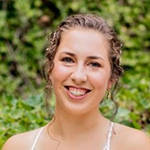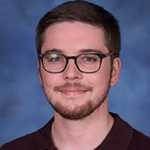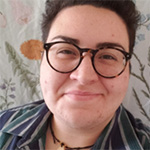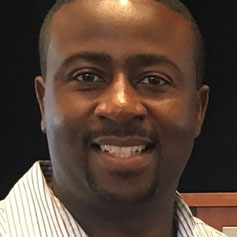Participants
Fellows

Megan Delaney
Megan is a 5th year PhD candidate at UMB, obtaining her degree in Human Genetics. She is in the lab of Dr. Zhe Han, working with the D. melanogaster model organism to determine how each of the actin and tubulin cytoskeleton genes play a role in the structure and maintenance of the nephrocyte. This information can then be used to further understand the pathogenesis of Nephrotic Syndrome in human podocytes. Megan is currently in her 3rd year in the Collaborative Teaching Fellowship Program at Stevenson University. She has assisted in Genetics Lecture/Lab, and Intro to Bio under Drs. Glaser, Stearn, and Obae. She is also the current leader of the Human Genetics Data Club, a student-run organization at UMB that allows members of her program to practice presenting their own data for various meetings in a safe and learning-positive zone. Megan hopes to gain invaluable experience in practicing creating student activities, guest lecturing, and overall guiding the students towards success in their class. She is also looking forward to presenting her work at a pedagogical conference and learning more ways to enhance the overall experience in the classroom not only for herself, but also for her future students.

Jennifer Viveiros
My name is Jennifer Viveiros and I am a 5th year Ph.D. candidate at Johns Hopkins University School of Medicine. I work in the lab of Dr. Erika Matunis and as a group we investigate the dynamics of the tissue microenvironments that support adult stem cells niche. After completing my thesis, I aim to hold a lecturer position at a higher education institution.

Khushbu Balsara, BDS (DDS), MPH
Dr Balsara is a Postdoctoral Research Fellow (PGY-2) at Johns Hopkins International Injury Research Unit (JH-IIRU), Johns Hopkins University, School of Medicine & School of Public Health. She received her BDS (USA equivalent of DDS/DMD) from Datta Meghe Institute of Medical Sciences and an MPH from the Johns Hopkins Bloomberg School of Public Health, concentrated in Health Systems & Policy with a track in Epidemiology & Biostatistics. She has background as an oral surgeon from India with interests in transforming healthcare and creating lasting global impact with an aim to provide improved and equitable preventive and surgical care across international health systems in low-income countries by strengthening research and developing programs. She has extensive skills and experience in mixed methods research, policy analysis, and global health, and has contributed to multiple projects, publications, and certifications in these domains. She is also a co-chair of the Communications Committee at Johns Hopkins Postdoctoral Association, where she leads and manages various initiatives to enhance the visibility and outreach of the postdoctoral community. Her expertise is centered on addressing the global challenges posed by non-communicable diseases (NCDs), particularly in the realms of health systems strengthening.

Jonathan Lawton, PhD
Jonathan Lawton is a PhD candidate in Molecular Epidemiology at the University of Maryland School of Medicine. Jonathan studied biology at the College of William & Mary, then decided to attend graduate school to help make a dent in the global pediatric infectious disease burden. His research uses bioinformatics – the confluence of biology, statistics, and data science – to better understand deadly parasitic infections among African children. After graduating, Jonathan plans to become a professor and bring his passion for bioinformatics to the undergraduate level. Through the ACCESS to PUIs program, Jonathan hopes to gain hands-on experience teaching undergraduate students and designing course curricula.

Bern Monari
Bern Monari (they/them/theirs) is a sixth year PhD candidate in the Ravel Lab at the University of Maryland School of Medicine. Their research focuses on characterizing the vaginal microenvironment of transmasculine persons accessing sustained testosterone therapy, uniting 3D cell culture models, clinical data, and the Ravel Lab’s extensive culture collection to study host-microbe interactions when the vaginal epithelium is exposed to testosterone. To complement their research training, Bern chose to participate in the Collaborative Teaching Fellowship Program (CTFP) to gain experience in teaching and mentoring undergraduate students. As a member of the 2023-2024 CTFP, they serve as an Adjunct Instructor in introductory biology (Cell Biology and Genetics) and microbiology labs at Stevenson University. Upon completion of their post-secondary training, Bern intends to pursue a career in higher education, with the CTFP providing key experience in evidence-based undergraduate STEM education at primarily undergraduate institutions.
Mentors

Dr. Sam Obae
Dr Sam Obae is a broadly trained Plant Scientist with expertise and research focus in conservation genetics and phytochemistry of high value medicinal plants. In the past ten years, he has spent his time at Stevenson University as a professor of biology in the Fine School of the Sciences where he has taught a wide range of undergraduate courses and mentored several students in biological sciences research. His main goal of partnering with CTFP is to serve the scientific community by providing teaching mentorship to PhD students who aspire to go into professorial careers at PUIs and SLACs. Although his participation at CTFP has been short, he has really appreciated the camaraderie of the fellow mentors and the opportunities the program has to offer to teaching fellows. He looks forward to continued participation in this program.

Professor Flo Martin
“Having Chris Taylor in our World Cinema class in the fall of 2023 surpassed my expectations for at least two reasons. First, it is always useful to have a savvy observer in the classroom with whom to discuss the class afterwards. And secondly, Chris brought his infectious passion for Japanese anime (the topic of his dissertation) to the course. He taught the class on his specialization, and we team-taught one on world animation. The students therefore had access to two different teaching voices, two gazes, two sets of questions. What appeared as a form of guided apprenticeship for Chris turned out to be a lovely, enriching collaborative experience for both of us.”
Patty Greenberg
My Goucher education launched my career in socio-medical and public health research. My calling to teaching was sparked when I returned to guest lecture and participate in alum panels. Since beginning to teach here in 2007 I have found that I love working with students. They push me to me hone my skills, their assertions challenge me, and their tenacity impresses me.
Nearing the end of my career, I mentor younger professionals to ensure that future students will have wonderful professors, as I did. I endeavor to round out their subject matter expertise with heart and humor, in the knowledge that they, too, will share many rewarding experiences while forging a more equitable and enlightened world. - Patty Greenberg
